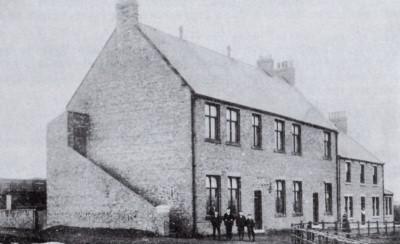Manipulating the iron and the fire could be exhausting and dangerous. If some clothes had become too dry they had to be sprinkled with water. When the iron was lifted from the fire it had to be tested in case it was too hot. The best way to do this was by spitting on it and observing the result. All the ironed clothes were hung on the clothes horse, and sometimes on a line that was stretched across the kitchen so that they were well aired before they were put away. All this work took place in the kitchen and the living room.
An Ordinary Weekday
Often a wife or mother would get out of bed during the night to attend to sons or husbands going to or coming from the pit. There was his bait to be put up -bread sandwiches mostly and a bottle of cold tea or, if he was coming in there would be a meal ready for him. Often the only time a woman had a rest was when she was 'confined' and she had to stay in bed with the baby for ten days or a fortnight and be visited by the midwife. At least she was supposed to stay in bed for this time. This was a chance for neighbours and friends to show their friendship. Of course the fires never went out completely but were backed up during the night by throwing an extra bucket of coal on. Our fireplace had a very long shelf at the back and we could throw five buckets of coal onto it ready to be raked down onto the fire with the tong coal rake. The ashes had to be raked out from under the bars and transferred into a bucket to be thrown into the midden. Some folk had a square metal box under the bars which made the job a little easier. These boxes and other articles were often made by mechanics at the pit. Then the mat would have to be taken outside and given a good shake, the floor swept and the hearth washed. If the street had a pavement running alongside the door the part in the front of the door was washed into a half moon shape. As well as this, the beds were to be made, and callers such as the milk man, yeast man and the grocer had to be attended to. Every day was a baking day if required but some days were social baking days. The big bread bowl was brought out flour weighed and emptied into it and yeast prepared and added. When it was ready it had to be left to rise then mixed by hand into a dough. This was then punched and pummelled, cut up, rolled and put into loaf tins, then laid on the fender to rise before being put into the oven. It was amazing how the women knew exactly when the oven was at the right temperature by feeling the oven knob. There were no thermometers or guides. For stotty cakes some fat was added to the dough and a flattened circle made before cooking. These stotties cold often be seen standing by the window sill to cool and were really delicious when spread with butter and treacle. Tea cakes with plenty of currants were another delicacy.
Friday
Friday was another extra busy day. The main work was concentrated on the fire-place. Most of the fenders were of steel as well as other bits such as the Tidy Betty, the hob over the fireplace and the oven handle. Sometimes these things were trimmed with brass knobs and sometimes there was a strip of brass under the mantle shelf which often sported brass ornaments such as boots, candlesticks and miniature fenders. These were polished shinning bright then the fender was laid aside.

The Miners' Hall, Trimdon Grange.
When the ashes were taken out and everything swept the whole fireplace was blackleaded with a substance which came in a tin or a similar liquid which came in a tin bottle. It was applied with a brush and then another brush was used to brighten and polish it. If the oven needed it, it was whitewashed out. Under the bars was also whitewashed a well as the hearth if there was no fancy tin plate for foundation.
The ordinary chores still had to be done, like cleaning the pit clothes. This was done by shaking the coats and the trousers and "dadding" them up against the wall to remove the coal dust. The pit boots looked more like iron, the leather being so hard and thick. The soles were studded with so many studs that an old knife was kept to scrape out all the dirt. A pay Friday which was from the time of fortnightly pay was a bit different for some agencies still collected fortnightly on that day. The good housewife would have all the books laid out on the table - insurance books, Purvis, Doggarts, Fidiams etc. Often the money was on top of each one so the collector could just walk in, collect the money and sign the book if the householder was busy or out he back swilling the yard - no locked doors in those days. Kiddies were sent to he Temperance Hall to pay the Rechabite money (a few coppers) and to the miners' hall to pay the union dues. If the men of the house were at work, some-ne would have to go to the colliery office to collect their pay on a Friday morning.